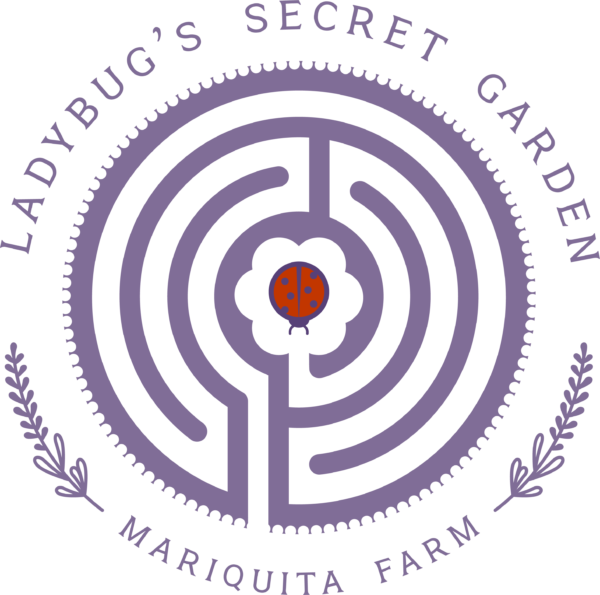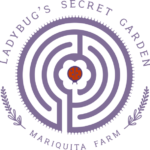A Tale of Avocados
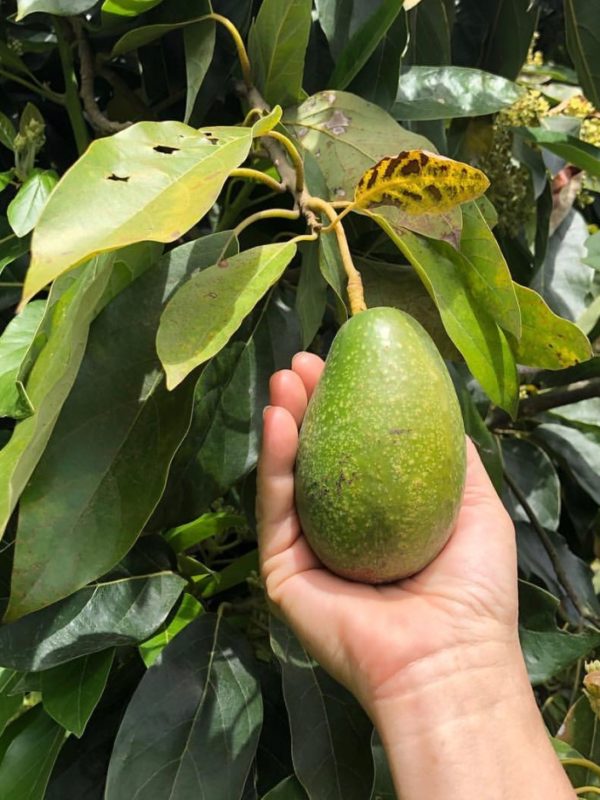
I don’t care what Marjorie Taylor Green or the other “researchers” from the Q-anon community say, the Bacon avocado is not the unholy, genetically modified bastard offspring of a guacamole tree and a salt cured pork. No! The Bacon avocado is so named because it was hybridised by a Mr. James Bacon back in the 1920s.
He was farming near Buena Park in Southern California and he named his new variety after himself. The Bacon avocado has a very nice fruit but it is not as popular today as it’s rivsa, the Hass avocado, is. But popularity has its limits, as we’ll see.
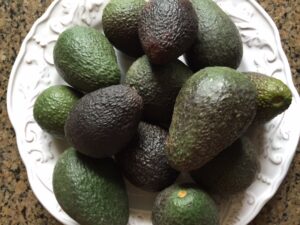 The Hass avocado is so ubiquitous in the contemporary American marketplace that for many consumers it is almost the only avocado that they know, the ne plus ultra of avocados, but the variety was only discovered in the late 1920s by a Mr. Rudolph Hass, postman and rare fruit enthusiast, who lived in Southern California near Whittier. (His children actually deserve the credit for discovering the variety because it was the kids who noticed how rich and unctuous the fruit was compared to other avocados and they drew his attention to the first tree from which all other trees were cloned.) But the avocado is a tree native to the Americas, probably originating in what is now Southern Mexico and Guatemala. Our English word, “avocado” is derived from the Nahual word “ahuacatl,” meaning “testicle.” But that’s not the only fun fact about the avocado plant.
The Hass avocado is so ubiquitous in the contemporary American marketplace that for many consumers it is almost the only avocado that they know, the ne plus ultra of avocados, but the variety was only discovered in the late 1920s by a Mr. Rudolph Hass, postman and rare fruit enthusiast, who lived in Southern California near Whittier. (His children actually deserve the credit for discovering the variety because it was the kids who noticed how rich and unctuous the fruit was compared to other avocados and they drew his attention to the first tree from which all other trees were cloned.) But the avocado is a tree native to the Americas, probably originating in what is now Southern Mexico and Guatemala. Our English word, “avocado” is derived from the Nahual word “ahuacatl,” meaning “testicle.” But that’s not the only fun fact about the avocado plant.Avocado trees are not fond of cold weather. Scientists believe that avocados evolved during a warmer, more humid time in Earth’s history when our planet’s social life was defined by “megafauna,” the REALLY BIG prehistoric mammals reached gargantuan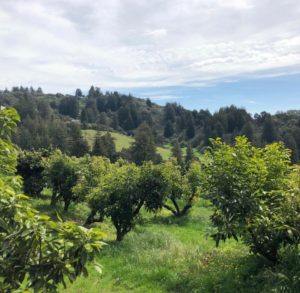 proportions by eating plants. One theory has it that avocados developed their oil-rich, flavorful fruit in order to appeal to the appetites of giant sloths, who would eat the fruits and then “disperse” the avocados’ big, round seeds around the jungle when they defecated. An avocado’s seed, or pit, is so big that you’d have to be a megafauna to “pass” one. Today, we not-so-mega mammals cultivate and disperse the avocado agriculturally and our attentions have changed the plant.
proportions by eating plants. One theory has it that avocados developed their oil-rich, flavorful fruit in order to appeal to the appetites of giant sloths, who would eat the fruits and then “disperse” the avocados’ big, round seeds around the jungle when they defecated. An avocado’s seed, or pit, is so big that you’d have to be a megafauna to “pass” one. Today, we not-so-mega mammals cultivate and disperse the avocado agriculturally and our attentions have changed the plant.
 proportions by eating plants. One theory has it that avocados developed their oil-rich, flavorful fruit in order to appeal to the appetites of giant sloths, who would eat the fruits and then “disperse” the avocados’ big, round seeds around the jungle when they defecated. An avocado’s seed, or pit, is so big that you’d have to be a megafauna to “pass” one. Today, we not-so-mega mammals cultivate and disperse the avocado agriculturally and our attentions have changed the plant.
proportions by eating plants. One theory has it that avocados developed their oil-rich, flavorful fruit in order to appeal to the appetites of giant sloths, who would eat the fruits and then “disperse” the avocados’ big, round seeds around the jungle when they defecated. An avocado’s seed, or pit, is so big that you’d have to be a megafauna to “pass” one. Today, we not-so-mega mammals cultivate and disperse the avocado agriculturally and our attentions have changed the plant.In nature there are many natural varieties of avocado with fruits that range in size from little quail’s eggs up to basketballs, but they’re all frost sensitive to a greater or lesser degree. When Mr. Bacon selected the “Bacon” avocado out of the different seedlings he was trialing, one of the positive attributes that the variety possessed was that it seemed to be a bit more tolerant of cold nighttime temperatures than other avocadoes. Here in California we’re at the outer edge of the climatic zone where avocado can survive- that was true for Mr. Bacon in Whittier and it’s especially true for us growers even further north up here in Central California. And the Bacon avocado does have a nice flavor and an appealing, buttery texture to the flesh.
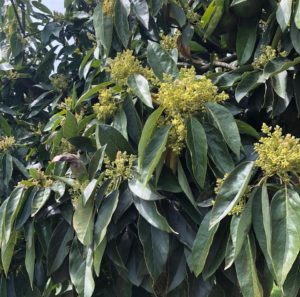 Avocados are often self-sterile, which means they will not self-pollinate. A Hass avocado tree will set some fruit after it gets older but it can’t be a really productive commercial crop unless it is cross pollinated with another variety of avocado. As avocados became popular in the United States beyond Southern California the Hass won the popularity contest in the marketplace. But you can’t have a viable Hass industry if you don’t also cultivate the pollinizer trees. Here in Central California I’ve seen growers use Zutano and Fuerte avocados as pollinators, but most farmers around here look to Bacons to get the job done. I like Bacons; I made a guacamole the other day using Rangpur Limes and Bacon avocados that came out very nicely. (I’ve planted a bunch of Rangpur limes, but at present only one tree is bearing. The Rangpur lime is actually a very tart type of mandarin orange, with a loose, thin skin and a bright scent. We should have a small harvest to pick and sell next year.)
Avocados are often self-sterile, which means they will not self-pollinate. A Hass avocado tree will set some fruit after it gets older but it can’t be a really productive commercial crop unless it is cross pollinated with another variety of avocado. As avocados became popular in the United States beyond Southern California the Hass won the popularity contest in the marketplace. But you can’t have a viable Hass industry if you don’t also cultivate the pollinizer trees. Here in Central California I’ve seen growers use Zutano and Fuerte avocados as pollinators, but most farmers around here look to Bacons to get the job done. I like Bacons; I made a guacamole the other day using Rangpur Limes and Bacon avocados that came out very nicely. (I’ve planted a bunch of Rangpur limes, but at present only one tree is bearing. The Rangpur lime is actually a very tart type of mandarin orange, with a loose, thin skin and a bright scent. We should have a small harvest to pick and sell next year.)In Mexico it is possible for avocado farmers to get two crops a year, or at least 3 crops in 2 years. We’re so far to the north that we can only count on one crop per year- if we’re lucky! Sometimes we get a hard frost that not only damages the fruit that is hanging on the tree, but also the avocado flower buds that would be the following year’s crop. This year, though, everything worked out. The Marsalisi Brothers are getting a decent crop of Bacons now, and there’s a nice crop of the Hass avocados that they pollinated coming in a couple of months.
—© 2021 Essay and Photos by Andy Griffin.
Top photo is a Bacon Avocado on a Marsalisi Brothers Farm tree.
If you haven’t ordered a mystery box recently, now is a great time to get in on spring deliciousness! LadybugBuyingClub
